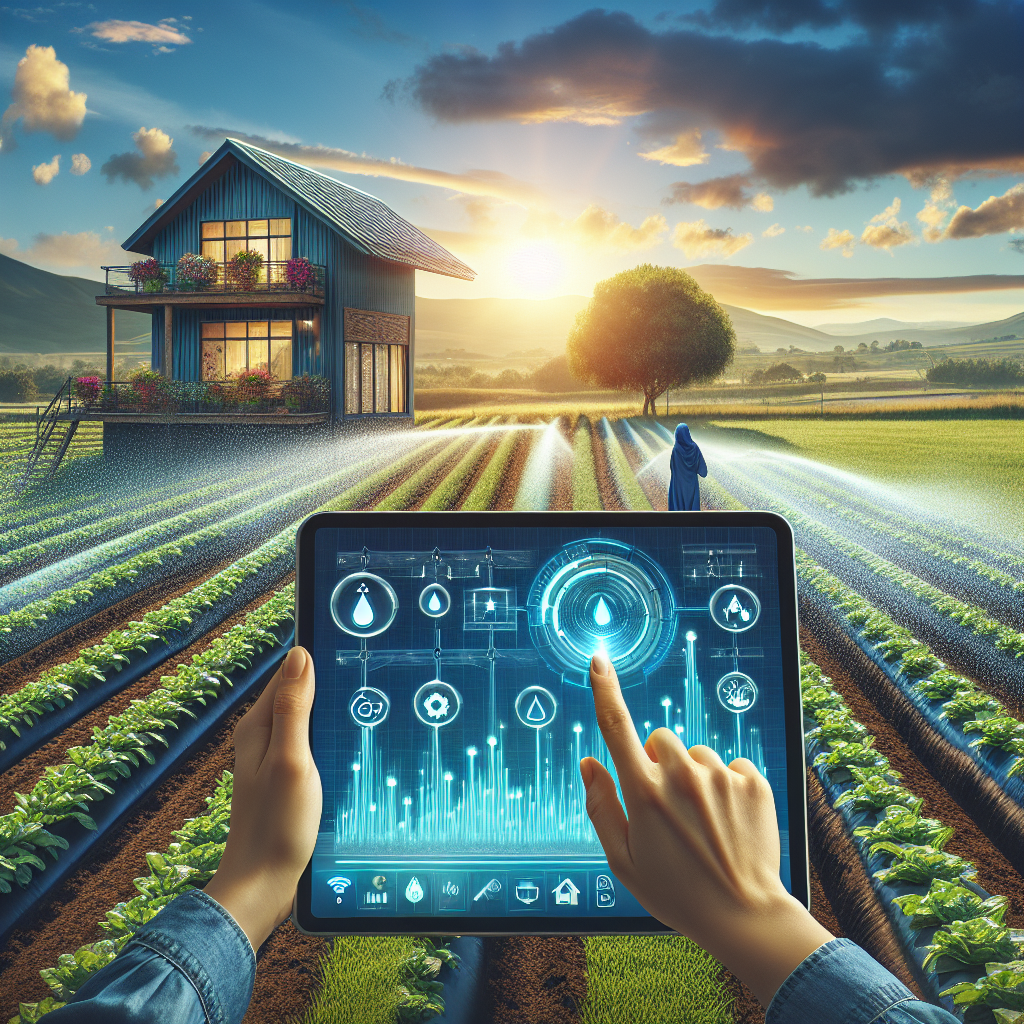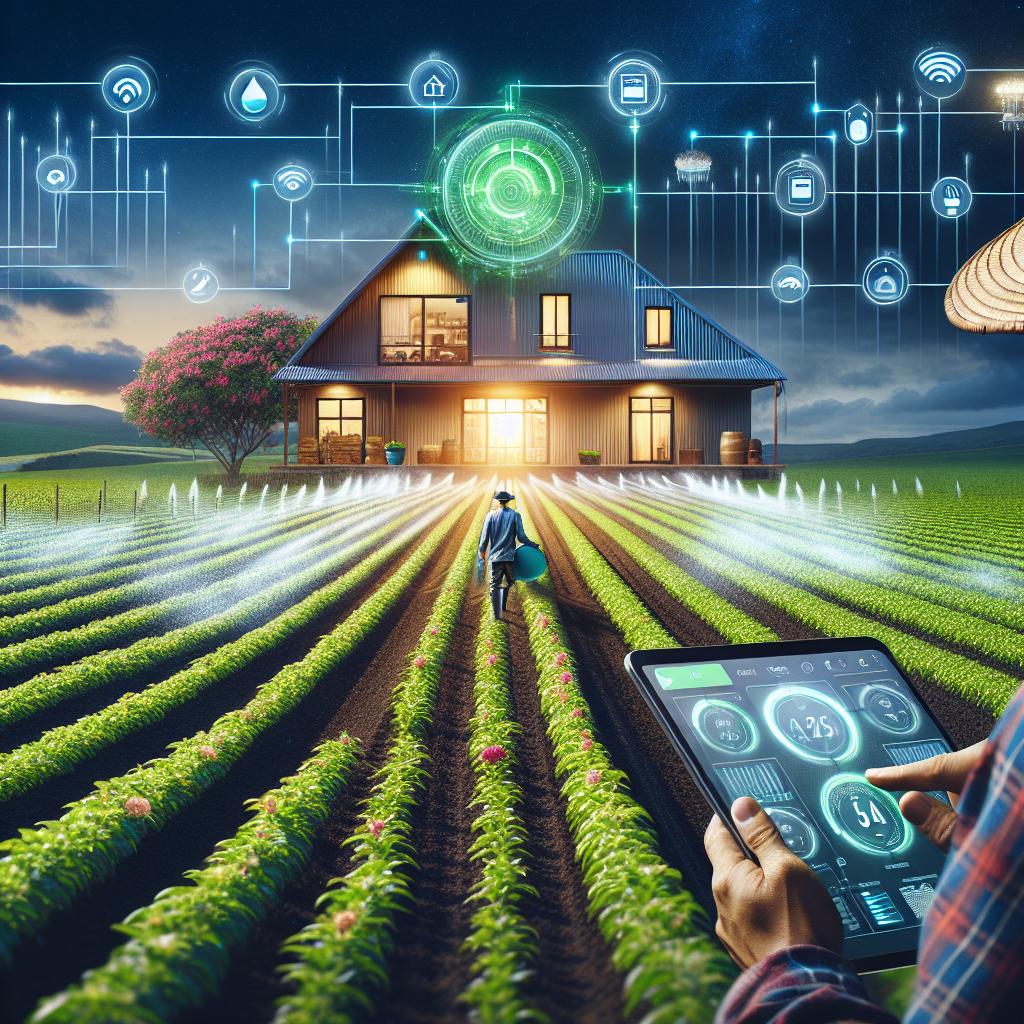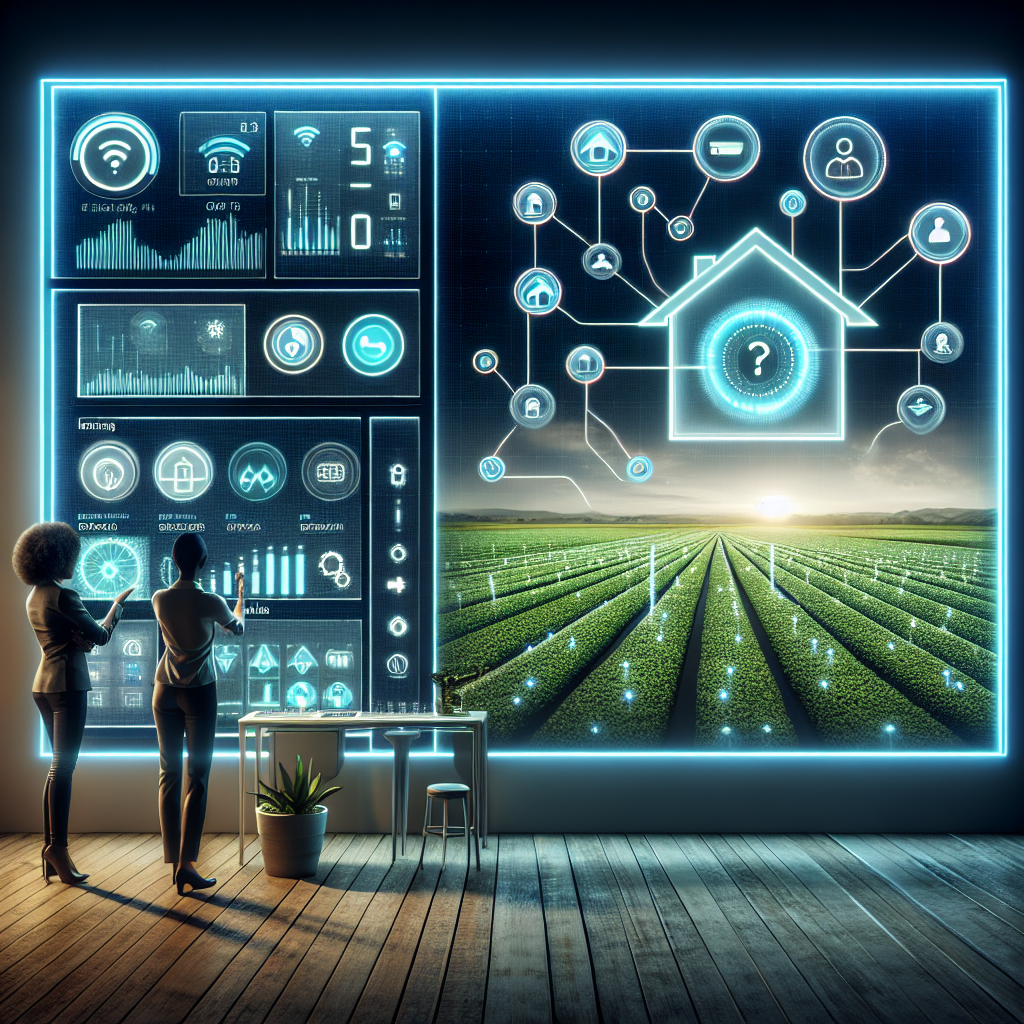As technology continues to revolutionize the way we live and work, the concept of smart home integration with smart irrigation for farms is taking center stage in the agriculture industry. This innovative approach combines the convenience and efficiency of smart home automation with the precision and effectiveness of smart irrigation systems, optimizing crop yields while minimizing water consumption. Imagine being able to remotely monitor and control irrigation schedules, soil moisture levels, and weather conditions from the comfort of your own home. With this seamless integration of cutting-edge technology, farmers can now achieve greater productivity and sustainability in their agricultural practices. Get ready to revolutionize your farm with smart home integration and smart irrigation!
Understanding Smart Home Integration in Farming

Smart home integration refers to the incorporation of intelligent technologies into agricultural practices to enhance efficiency, productivity, and sustainability. This entails connecting various devices, sensors, and systems within a farm to a centralized smart control system that can be accessed remotely.
- Definition of smart home integration
- Smart home integration involves the automation and monitoring of farm operations through the use of interconnected devices such as sensors, controllers, and actuators.
-
These devices collect data on environmental conditions, soil moisture levels, crop health, and other relevant parameters to optimize irrigation and resource management.
-
Importance of smart technology in agriculture
- Smart technology plays a crucial role in modern agriculture by enabling farmers to make data-driven decisions and improve overall operational efficiency.
- By integrating smart irrigation systems with smart home technology, farmers can remotely monitor and control water usage, leading to significant water savings and improved crop yields.
- The ability to analyze real-time data collected from sensors allows for precise irrigation scheduling based on actual crop needs, reducing water wastage and minimizing environmental impact.
Benefits of Smart Home Integration for Farming
Understanding Smart Home Integration in Farming
-
Increased efficiency in resource management
Smart home integration with smart irrigation systems allows farmers to optimize the use of resources such as water, fertilizers, and energy. By automating irrigation processes based on real-time data and weather conditions, farmers can ensure that crops receive the right amount of water at the right time, reducing wastage and improving overall efficiency. -
Real-time monitoring and control
One of the key benefits of smart home integration for farming is the ability to monitor and control irrigation systems remotely. Farmers can access data on soil moisture levels, weather forecasts, and irrigation schedules from their smartphones or computers, enabling them to make adjustments as needed without having to be physically present on the farm. This real-time monitoring capability helps farmers respond quickly to changing conditions and prevent over or under-watering of crops. -
Data-driven decision-making
Smart home integration also enables data-driven decision-making in farming. By collecting and analyzing data from sensors, weather stations, and other sources, farmers can gain insights into crop health, soil conditions, and water usage patterns. This information can be used to optimize irrigation schedules, identify areas of improvement, and make informed decisions to increase crop yields and profitability.
Smart Irrigation Systems for Farms
Smart irrigation systems for farms have revolutionized traditional agricultural practices by incorporating advanced technology to optimize water usage and increase crop productivity.
- Overview of smart irrigation technology
- Smart irrigation technology utilizes sensors, weather data, and automation to precisely monitor soil moisture levels, weather conditions, and crop water requirements.
- These systems are designed to deliver the right amount of water at the right time, minimizing water wastage and ensuring that crops receive adequate hydration for optimal growth.
-
By leveraging data-driven insights, smart irrigation systems enable farmers to make informed decisions about irrigation scheduling and reduce the risk of over or under-watering.
-
Importance of efficient irrigation in agriculture
- Efficient irrigation is crucial for sustainable agriculture as water scarcity becomes a growing concern worldwide.
- Smart irrigation systems help farmers conserve water resources by preventing water runoff and evaporation, leading to significant cost savings and environmental benefits.
- By promoting water efficiency, these systems contribute to the long-term viability of agricultural operations while supporting crop health and yield stability.
Components of Smart Irrigation Systems
- Soil moisture sensors
Soil moisture sensors are crucial components of smart irrigation systems for farms. These sensors are designed to measure the moisture content in the soil accurately. By providing real-time data on soil moisture levels, farmers can make informed decisions about when and how much to water their crops. The sensors eliminate the guesswork involved in traditional irrigation methods by allowing for precise watering based on the actual needs of the plants. This not only conserves water but also promotes healthier plant growth and higher yields.
- Weather data integration
Integrating weather data into smart irrigation systems is essential for optimizing water usage on farms. By incorporating information such as temperature, humidity, wind speed, and rainfall forecasts, the system can adjust irrigation schedules accordingly. For example, if a storm is predicted, the system can preemptively reduce or pause irrigation to prevent overwatering. By leveraging weather data, farmers can ensure that their crops receive the right amount of water at the right time, leading to improved efficiency and sustainability in agricultural practices.
- Automated irrigation scheduling
Automated irrigation scheduling is a key feature of smart irrigation systems that streamlines the process of watering crops. By programming the system to water based on specific parameters such as soil moisture levels, plant type, and weather conditions, farmers can save time and resources while maximizing crop yield. The system can be set to operate on a predefined schedule or adapt in real-time based on sensor readings and weather updates. This automation not only simplifies irrigation management but also allows for more precise and efficient water distribution, ultimately benefiting both the farm productivity and environmental conservation efforts.

Integrating Smart Home Technology with Smart Irrigation
In the realm of modern agriculture, the integration of smart home technology with smart irrigation systems has revolutionized the way farmers manage water resources and optimize crop production. This integration involves the seamless connection of smart irrigation systems to home networks, enabling farmers to remotely monitor and control irrigation processes with greater efficiency and precision.
Connecting smart irrigation systems to home networks
Smart irrigation systems are equipped with sensors that collect real-time data on soil moisture levels, weather conditions, and plant water requirements. By connecting these systems to home networks, farmers can access this data from their smartphones or computers, allowing them to make informed decisions regarding irrigation scheduling and water distribution. This connectivity also enables automatic adjustments to irrigation settings based on environmental factors, ensuring optimal water usage and crop health.
Utilizing IoT devices for seamless integration
The Internet of Things (IoT) plays a crucial role in the integration of smart home technology with smart irrigation for farms. IoT devices such as moisture sensors, weather stations, and actuators communicate with the smart irrigation system through the home network, facilitating data exchange and control functionalities. This seamless integration enables farmers to create customized irrigation schedules, receive real-time alerts on system status, and remotely adjust irrigation settings to meet the specific needs of their crops.
By leveraging smart home technology and IoT devices, farmers can enhance the efficiency, productivity, and sustainability of their irrigation practices, ultimately leading to improved crop yields and resource conservation.
Advantages of Integrating Smart Home Technology with Smart Irrigation
- Remote access and control of irrigation systems
Smart home integration allows farmers to remotely monitor and control their irrigation systems from anywhere, using their smartphones or other connected devices. This level of accessibility enables real-time adjustments to watering schedules based on crop needs or changing weather conditions. By being able to turn irrigation systems on or off remotely, farmers can ensure that their crops receive the right amount of water at the right time, ultimately leading to improved yields and resource efficiency.
- Enhanced automation and optimization of water usage
Integrating smart home technology with irrigation systems enables automation features that can optimize water usage on the farm. Sensors and smart controllers can collect data on soil moisture levels, weather patterns, and plant water requirements to automatically adjust irrigation schedules. This automation not only saves farmers time and effort but also ensures that water is used more efficiently, reducing waste and promoting sustainable farming practices.
- Integration with weather forecasting for precision irrigation
By combining smart home technology with weather forecasting capabilities, farmers can implement precision irrigation strategies that take into account upcoming weather conditions. Using real-time weather data, irrigation systems can adjust watering schedules to account for factors like rainfall, humidity, and temperature fluctuations. This proactive approach to irrigation helps prevent overwatering or underwatering, leading to healthier crops, reduced water consumption, and overall improved farm productivity.
Challenges and Considerations
Data security and privacy concerns
- Smart home integration with smart irrigation systems for farms brings about significant data security and privacy concerns.
- The interconnected nature of these systems means that sensitive farm data, such as irrigation schedules and crop health information, is vulnerable to cyber threats.
- Unauthorized access to this data could lead to detrimental consequences for farm operations and compromise the integrity of the entire agricultural process.
- Implementing robust encryption protocols and access controls is essential to mitigate these risks and safeguard farm data from potential breaches.
- Farmers must also stay informed about the latest cybersecurity measures and constantly update their systems to stay ahead of evolving threats in the digital landscape.
Compatibility issues with existing farm infrastructure
- Integrating smart home technology with smart irrigation systems on farms may present challenges due to compatibility issues with existing infrastructure.
- Many farms have legacy equipment and systems that may not easily integrate with newer smart technologies, leading to operational inefficiencies and communication breakdowns.
- Adapting these disparate systems to work together seamlessly requires careful planning, investment in compatible hardware and software, and possibly retrofitting existing infrastructure to meet the integration requirements.
- Farmers need to conduct thorough assessments of their current setup and work closely with technology providers to ensure smooth integration without disrupting ongoing agricultural activities.
Maintenance and technical support for integrated systems
- Maintaining and providing technical support for integrated smart home and smart irrigation systems pose additional challenges for farmers.
- The complexity of these interconnected systems necessitates regular maintenance to ensure optimal performance and prevent system failures that could result in crop loss or water wastage.
- Farmers may face difficulties troubleshooting issues that arise from the integration of multiple technologies, requiring specialized technical expertise and support services to address these concerns promptly.
- Establishing partnerships with reliable technology vendors and service providers can help farmers access the necessary maintenance and technical support to keep their integrated systems running smoothly and efficiently.
Overcoming Challenges in Integration
d Considerations
- Implementing robust cybersecurity measures
In the integration of smart home technology with smart irrigation systems for farms, one of the primary challenges is ensuring robust cybersecurity measures are in place. With the interconnected nature of these systems, there is an increased risk of cyber threats and potential vulnerabilities. Implementing strong encryption protocols, multifactor authentication, and regular security audits are essential steps to safeguarding the entire network from unauthorized access and data breaches.
- Conducting thorough compatibility assessments
Another critical aspect of overcoming challenges in integration is conducting thorough compatibility assessments between the smart home devices and the smart irrigation systems. Compatibility issues can arise due to differences in communication protocols, data formats, or hardware requirements. By meticulously evaluating the compatibility of all components involved in the integration process, potential conflicts can be identified and resolved proactively, ensuring seamless operation and optimal performance.
- Establishing reliable maintenance protocols

Establishing reliable maintenance protocols is crucial for the successful integration of smart home technology with smart irrigation systems on farms. Regular maintenance tasks such as software updates, system checks, and sensor calibrations are essential to prevent malfunctions, optimize efficiency, and prolong the lifespan of the integrated system. By creating a structured maintenance schedule and implementing proactive maintenance practices, farmers can minimize downtime, reduce operational costs, and ensure the continuous functionality of their smart irrigation setup.
Future Trends in Smart Home Integration for Farming
Advancements in AI for predictive irrigation:
- AI algorithms are being increasingly utilized in smart home integration for farming to predict irrigation needs accurately.
- These advanced systems analyze data from various sources such as weather forecasts, soil moisture levels, and plant requirements to determine the optimal irrigation schedule.
- By leveraging AI technology, farmers can minimize water wastage, reduce costs, and enhance crop yields.
Integration with drone technology for aerial monitoring:
- The integration of drone technology with smart home systems is revolutionizing farming practices by providing real-time aerial monitoring of fields.
- Drones equipped with sensors capture high-resolution images and data, allowing farmers to assess crop health, detect pest infestations, and identify irrigation needs efficiently.
- This integration enhances decision-making processes and enables farmers to take timely actions to optimize irrigation and crop management practices.
Expansion of smart farming practices globally:
- Smart home integration for farming is witnessing rapid global expansion as more farmers recognize the benefits of adopting technology-driven solutions.
- Developing countries are increasingly embracing smart farming practices to improve agricultural productivity, conserve resources, and mitigate the impact of climate change.
- The proliferation of smart irrigation systems in farms worldwide signifies a shift towards sustainable and efficient agricultural practices on a global scale.
Sustainable Practices in Smart Farming
- Utilizing renewable energy sources for powering smart systems
In the realm of sustainable practices in smart farming, the integration of renewable energy sources stands out as a pivotal element. Farmers are increasingly turning to solar panels, wind turbines, and other forms of renewable energy to power their smart irrigation systems. By harnessing the power of the sun or wind, farmers can significantly reduce their reliance on non-renewable energy sources, thereby lowering their carbon footprint and operating costs. This shift towards renewable energy not only promotes environmental sustainability but also contributes to the overall resilience of farming operations.
- Implementing precision agriculture techniques for resource conservation
Precision agriculture techniques are revolutionizing the way farmers manage their resources, leading to more sustainable farming practices. By leveraging technologies such as GPS, sensors, and data analytics, farmers can precisely monitor and manage irrigation, fertilization, and pesticide application. This targeted approach not only enhances crop yields and quality but also minimizes the use of water, nutrients, and chemicals. As a result, farmers can optimize resource efficiency, reduce waste, and mitigate environmental impact, all while maintaining or even improving farm productivity.
- Collaborating with environmental agencies for eco-friendly farming practices
Collaboration between farmers and environmental agencies plays a crucial role in promoting eco-friendly farming practices. By working together, farmers can access valuable resources, expertise, and funding to implement sustainable initiatives on their farms. Environmental agencies can provide guidance on conservation practices, regulatory compliance, and incentive programs that support environmentally friendly farming methods. Through such partnerships, farmers can enhance biodiversity, protect natural habitats, and adopt practices that promote soil health and water quality. Ultimately, these collaborative efforts contribute to the preservation of ecosystems and the promotion of sustainable agriculture.
FAQs: Smart Home Integration with Smart Irrigation for Farms
What is smart home integration with smart irrigation for farms?
Smart home integration with smart irrigation for farms involves using technology to automate and optimize the irrigation process on agricultural land. This includes using sensors, weather data, and automated systems to efficiently water crops, ultimately leading to increased yields and water conservation.
How does smart home integration benefit farmers?
Smart home integration with smart irrigation benefits farmers by providing them with real-time access to irrigation data, allowing them to make informed decisions and adjustments to their irrigation schedules. This technology can also help farmers reduce water usage, energy costs, and labor expenses, ultimately improving overall farm profitability.
What components are typically involved in a smart home integration system for smart irrigation on farms?
A smart home integration system for smart irrigation on farms typically includes sensors to monitor soil moisture levels, weather data to adjust irrigation schedules based on forecasted conditions, and automated irrigation systems to deliver the right amount of water to crops. Additionally, these systems may also be connected to farmers’ smartphones or computers for remote access and control.
How easy is it to install and use a smart home integration system for smart irrigation on farms?
The ease of installing and using a smart home integration system for smart irrigation on farms can vary depending on the complexity of the system and the technical expertise of the user. Some systems may require professional installation, while others can be easily set up by farmers themselves with the help of user-friendly interfaces and guides. Once installed, these systems are typically user-friendly, allowing farmers to monitor and adjust irrigation settings with ease.
Are there any cost-saving benefits to using smart home integration with smart irrigation on farms?
Yes, there are cost-saving benefits to using smart home integration with smart irrigation on farms. By optimizing water usage and reducing energy costs, farmers can see significant savings in their overall operational expenses. Additionally, the increased yields and improved crop quality resulting from more efficient irrigation practices can lead to higher profits for farmers in the long run.